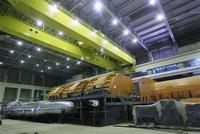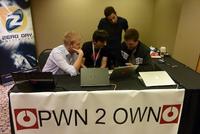-
China raises rare Earth elements production
China has about 30 percent of rare earths deposits but accounts for 97 percent of global production; the Ministry of Land and Resources said Thursday that this year’s production quota of rare earths will be 93,800 tons, an increase of about 5 percent over 2010
-
-
San Francisco to regulate private biological agent detectors
Some firms have begun selling building owners and companies untested devices designed to detect anthrax and other biological agents, but city officials are worried that these will generate false alarms; in San Francisco city officials estimate that responding to a false alarm generated by a biological agent detector could cost as much as $700,000; legislation has been introduced to regulate these devices; the bill would require those who have biological agent detectors to pay an annual fee and owners would also be fined as much as $10,000 for false alarms; if passed, owners would have ninety days to register with the city
-
-
U.S. industrial processes vulnerable to Stuxnet-like attack

Cyber security experts recently warned that U.S. manufacturing plants and critical infrastructure were vulnerable to a Stuxnet-like attack; industrial plants, transportation systems, electrical grids, and even nuclear plants could be crippled by new cyber weapons that target specialized control core processes; concern has spread after the Stuxnet virus targeted these systems and created physical damage; experts have likened Stuxnet to “the arrival of an F-35 into a World War I battlefield”
-
-
DigiSensory cameras predict crime before it happens
With DigiSensory Technologies’ sophisticated cameras and sensor systems, law enforcement agencies and transportation departments across the United States are now able to proactively monitor and respond to crimes or accidents as they unfold; the company’s Avista sensors process the images that its 3.2 megapixel high-resolution camera records in real time and can automatically detect when a crime is occurring; when it senses something it will alert law enforcement officials instantly; the sensors can also assist transportation departments in analyzing traffic patterns in real time; the system could allow officials to change one way streets, design real time traffic signals, and multiple speed limits to make traffic flow more smoothly
-
-
Businesses cannot defend against cyber attacks, expert says
In a recent testimony before Congress, a cyber security expert warned that the private sector in the United States has proven unable to defend the nation’s critical cyber infrastructure from attack; businesses own 85 percent of critical infrastructure and they have not invested in the skills or technology to secure it from cyber attack leaving the electrical grid, financial services, and other key elements vulnerable; foreign intelligence agencies, organized gangs, and corporate spies have successfully infiltrated banks, multinational corporations, and even government websites and stolen sensitive data; cyber security experts urged for greater government regulation to secure U.S. networks
-
-
Android and Windows 7 phone confound hackers in competition

Android smartphones and the Windows 7 phone foiled hackers at the recent Pwn2Own hacking competition, while the Apple iPhone and Blackberry were successfully broken into; the results do not necessarily mean that Android and Windows 7 phones are more secure; several factors determine the relative protection a device has against hackers including the security of the software itself and the amount of research that has already been conducted on the device’s weakness; observers were surprised to see the Android repel attacks, but were not shocked when the iPhone was hacked
-
-
Lockheed developing autonomous and covert rover
A surveillance robot aims to operate around humans without being detected by them; the machine uses a laser scanner to builds a 3D computer model of its surroundings and uses a set of acoustic sensors to distinguish the proximity and direction of footsteps
-
-
Alstom acquires CA company, seeks to enter U.S. smart grid market
French electrical grid manufacturer Alstom recently acquired Utility Integration Solutions, Inc. (UISOL) in its efforts to expand its smart grid control room capabilities and enter the U.S. market; UISOL specializes in demand response management systems, which are critical to the operation of smart grids; analysts believe that this could put Alstom in position to become an integrated systems provider for smart grids in the United States on par with ABB, Siemens, and General Electric
-
-
Northrop awarded $1.1 billion DHS contract
Northrop Grumman Corp. recently announced that it was awarded a government contract worth up to $1.1 billion to “operate, maintain, and enhance” classified networks for DHS; Northrop will build and maintain a classified network that will transmit data, voice, and video to over 15,000 users; the system is designed using a proprietary cloud-based computing model that can be accessed remotely
-
-
TSA looking for shoe scanning devices
DHS is seeking companies to which it will award a contract for shoe scanners; according to the Office of Federal Business Opportunities, the Shoe Scanning Device (SSD) system currently sought by the TSA and DHS “will be capable of detecting threat objects concealed in footwear without requiring passengers to remove their footwear as they pass through a security checkpoint. These threat objects include a wide variety of military, commercial, and homemade explosives or explosives devices”
-
-
Authors suggest ways to alleviate L.A. cargo port "constipation"

In January, the port of Los Angeles received more than 330,000 containers; the possibility that one of those 330,000 containers could have contained a dirty bomb, or worse, keeps security experts up at night; experts say that to ensure security and prevent logjams, the best approach to container security would be to replace the current system, which singles out only those containers whose documentation raises questions, with a system which will see terminal operators X-ray every container, regardless of its eventual destination; only those containers flagged during the low-level scan would be subjected to a more thorough search
-
-
Mark Krikorian, executive director of the Center for Immigration Studies
Mark Krikorian, the executive director of the Center for Immigration Studies, was interviewed by Homeland Security NewsWire’s executive editor, Eugene Chow; Krikorian discusses the Obama administration’s immigration strategy, why mass migration is an outdated phenomenon, and what the government can do to enforce immigration laws effectively; “make E-Verify mandatory,” he says
-
-
GAO scrutinizes DHS financial management system
The Government Accountability Office (GAO) has thrown a wrench in DHS’s long-running effort to modernize its financial management system, upholding a protest of the department’s most recent award; the decision could be significant for agencies reevaluating their IT programs in the wake of a slate of Office of Management and Budget (OMB) reviews launched last year
-
-
Michigan law enables executives to privatize security
Michigan’s new Emergency Manager law, in addition to allowing previously negotiated union contracts to be voided, gives appointees the authority to privatize police services and jails; some are worried that the rush to cut police labor costs will impair public safety; critics say that savings from privatization are illusory
-
-
After EPA fine, mining company building $200 million water treatment plant

America’s largest underground coal mining company, Consol Energy, is constructing a $200 million water treatment plant in West Virginia, after being fined $5.5 million by the Environmental Protection Agency (EPA); in 2009 discharge from Consol’s mining operation caused a toxic golden algae bloom that killed aquatic life along thirty miles of Dunkard Creek; the advanced waste water treatment plant will be the largest facility in Appalachia; the plant will be capable of treating 3,500 gallons of water per minute and will remove more than forty-three tons of dissolved solids, including eleven million pounds of chloride
-
- All
- Regional
- Water
- Biometrics
- Borders/Immig
- Business
- Cybersecurity
- Detection
- Disasters
- Government
- Infrastructure
- International
- Public health
- Public Safety
- Communication interoperabillity
- Emergency services
- Emergency medical services
- Fire
- First response
- IEDs
- Law Enforcement
- Law Enforcement Technology
- Military technology
- Nonlethal weapons
- Nuclear weapons
- Personal protection equipment
- Police
- Notification /alert systems
- Situational awareness
- Weapons systems
- Sci-Tech
- Sector Reports
- Surveillance
- Transportation
Advertising & Marketing: advertise@newswirepubs.com
Editorial: editor@newswirepubs.com
General: info@newswirepubs.com
2010-2011 © News Wire Publications, LLC News Wire Publications, LLC
220 Old Country Road | Suite 200 | Mineola | New York | 11501
Permissions and Policies
Editorial: editor@newswirepubs.com
General: info@newswirepubs.com
2010-2011 © News Wire Publications, LLC News Wire Publications, LLC
220 Old Country Road | Suite 200 | Mineola | New York | 11501
Permissions and Policies
